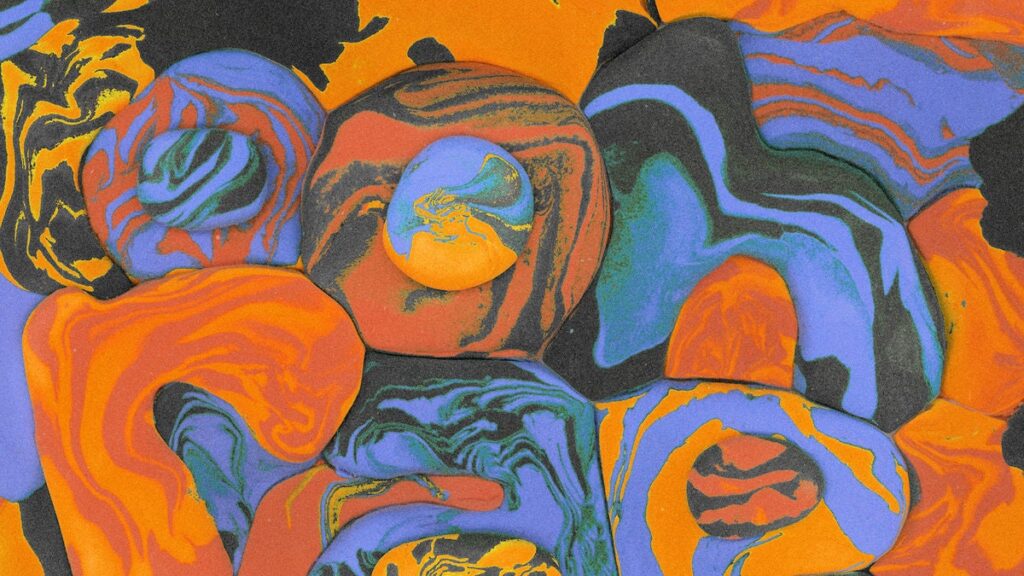
What happens when a genre inspired by the hollowness of branding itself becomes a brand? Over the last few years, George Clanton’s 100% Electronica label has carried forward the momentum of a decade of vaporwave, taking the genre offline, launching festivals and merchandise, and minting an overall more consumer-friendly presentation of a sound once confined to the most baffling corridors of the internet. Though he’s remained a constant ringleader, Clanton himself has been relatively quiet in terms of output, only dropping the occasional loose single and a collaborative album with the frontman of 311. As his profile continued to rise, it remained to be seen how he would eventually follow up his invigorating 2018 debut, Slide.
After five years, the questionably titled Ooh Rap I Ya reveals that not much has changed: ’90s big beat drums reign supreme, shoegazey guitars provide some modern polish, and Clanton’s voice is still swinging for Tears for Fears levels of anthemic cheese. Where Slide deftly blended Clanton’s various projects together—melding his smudged electro-pop as Mirror Kisses and more traditionally vaporwave collages as ESPRIT 空想 into one body-thrashing rockstar entity—Ooh Rap I Ya struggles to find new or better ways to make the pieces fit. The longer it goes on, the more its densely smeared synths start to feel confused rather than euphoric.
The songs on Ooh Rap I Ya can be roughly split into two categories, each attempting to unveil a deeper layer to Clanton’s persona. On one hand are songs like “Justify Your Life,” “I Been Young,” and “F.U.M.L.,” which take the charged-up Y2K pop of Slide and refract it through a wearier lens, casting Clanton as a hungover partygoer who’s getting older and coming to terms with past mistakes. The remaining tracks (concentrated in the back half of the album) showcase Clanton the psychedelic soundscaper, favoring his slo-mo production and largely relegating vocals to the background. Each half has its moments and misses, but taken together, they suggest an artist without a particularly strong commitment to either direction.
When Clanton does hit the target, the results are nectar-sweet: “Justify Your Life” cultivates a vintage downbeat haze, its trip-hoppy drums and fretless bassline rolling in like waves. It feels like something you’d find on a VHS compilation of forgotten MTV-era breakup jams (you can practically see the overdone blue filters and piped-in rain). Nostalgia figures heavily into Clanton’s chillwave boyband playbook, and he knows how to have fun with these tropes, even if it’s only skin deep. “I Been Young” is a best-case scenario, its slamming Breakfast Club piano chords conjuring a sense of time passing by—a sentimental slow-rider served with a wink. Some of Clanton’s impressions are better than others though; getting to the song’s arms-in-the-air chorus requires wading through a verse where Clanton hisses in a limp staccato somewhere between Michael Jackson and Justin Timberlake, undercutting any emotional catharsis. At a certain point, ironically embracing corniness just circles back to being corny again.
“You Hold the Key and I Found It” kicks off the album’s more instrumental stretch by digging into a deep groove of looping drum breaks and syrupy synths that hit a pleasingly stoned stride. “Vapor King / SubReal” achieves a similar effect, but as the tracks keep coming, the limits of Clanton’s beatmaking toolbox become increasingly apparent. Songs breeze past the five-minute mark without evolving much, and by the fourth time he’s wheeled out a drum sample that sounds like it was pulled from a folder of Screamadelica outtakes, it’s hard not to tune out. This might be for the best, as the album’s final songs begin to incorporate a kind of sing-songy chanting that recalls the sounds of old “world music” dollar-bin fodder. And if there’s some deeper meaning to the gibberish mantra of the title track, Clanton doesn’t illuminate it.
Vaporwave has taken on its share of regrettable baggage over the years, but in spite of its complicated reputation, the genre really did predict a sea change in the way popular music would be created, consumed, and understood in a post-internet world. Clanton has made it his goal to take that legacy into the future, but Ooh Rap I Ya plays it entirely too safe, feeling less like a biting subversion of nostalgia than a straight-up “remember when.” This could have been saved by meatier hooks, a more realized emotional arc, or production choices that didn’t feel as if they were well and fully covered by Neon Indian and Washed Out over a decade ago. As is, these tracks are neither heady enough to coast purely on vibes, nor consistently catchy enough to work as pop, leaving one with the impression that Clanton’s strengths might lie more in branding than songwriting.
